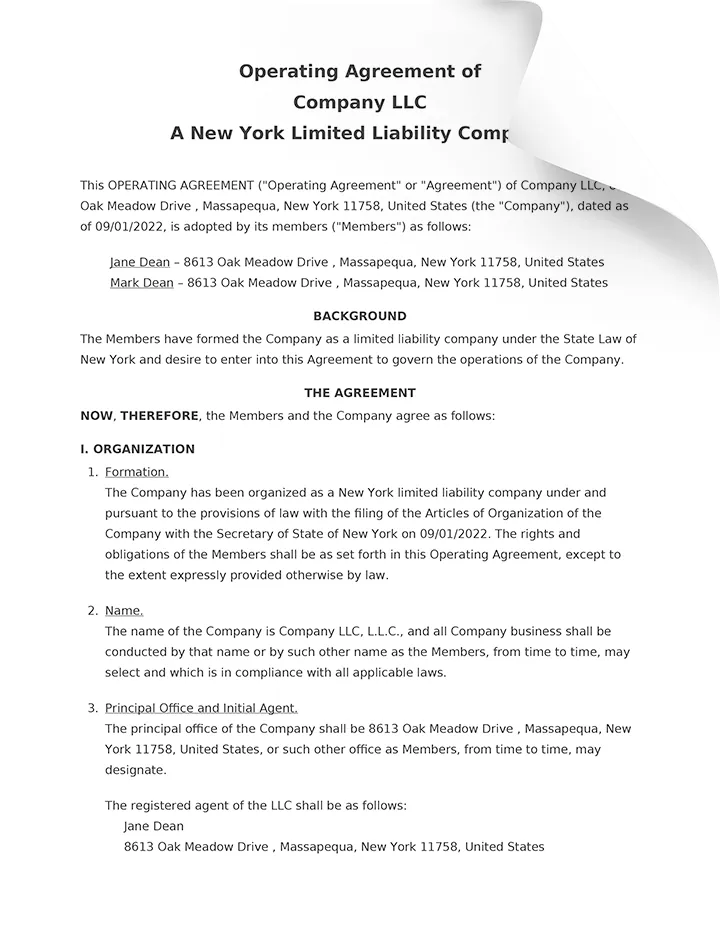What Is An LLC Operating Agreement?

A Limited Liability Company (LLC) Operating Agreement, sometimes referred to as an LLC Company Agreement, is a legally binding document that details the rights and obligations of each member of your LLC.
The agreement is between all the LLC members of the limited liability company and it defines a set of rules according to which the company will be run.
An operating agreement for LLC should display how a company is organized, who the members are, and which portion of the company they own.
From daily operations like invoicing and payroll to what would happen in certain scenarios, such as a member wanting to leave an LLC, an operating agreement is crucial to your company, and you should create this document as soon as you form your LLC.
When Do I Need an LLC Operating Agreement?
Crafting an operating agreement should be a priority as soon as your LLC is formed. This document serves as a safeguard for your company, protecting the interests of its members and ensuring smooth operations.
If you form a limited liability company in a state where the laws require you to create an operating agreement, you have no choice but to have one.
Here is a list of states that require LLCs:
- California
- Delaware
- Maine
- Missouri
- New York
In the table below, we’ve outlined what each of these states typically requires in an LLC operating agreement:
| State / Requirements | Type of Form Accepted | Requires Specific Provisions | Required Time of Execution |
| California | Written or oral agreement | No | None |
| Delaware | Written, oral, or implied agreement | No | Around the time of filing for the formation of the LLC |
| Maine | Written, oral, or implied agreement | No | Around the time of filing for formation of the LLC |
| Missouri | Written or oral agreement | Yes | None |
| New York | Written agreement | Yes | None |
Remember, the table above is just a guideline. It’s always best to consult your state’s rules to make sure you’re not missing anything.
States often have different LLC operating agreement templates, which is why you must ensure you use the correct one for the location of your business.
Why is an LLC Operating Agreement important?
An LLC Operating Agreement holds significant importance for the smooth operation and legal protection of a limited liability company (LLC). Here are reasons why having an LLC Operating Agreement is crucial and how it benefits both the company and the LLC members:
1. An LLC Operating Agreement fortifies the separate existence of the LLC from the LLC members
Failing to have an LLC Operating Agreement in place can jeopardize the legal recognition of your business as a separate entity distinct from its owners. This, in turn, exposes your personal assets to potential risks and company liabilities.
Separating the company assets from that of the members is probably the exact reason why you formed an LLC in the first place.
When things are going smoothly, you may get away with not having one. But when the company runs into any legal action or audit, the personal assets of the LLC member will be put on the line, especially in states that require members to have one.
For those who are organized in a state where an operating agreement is not required, the following are reasons why it’s good to have one anyway:
2. To clearly define roles, responsibilities, and share in the profits
An LLC Operating Agreement is important because it provides a solid foundation for your company by clearly defining roles, responsibilities, and ownership percentages, reducing the potential for disputes or misunderstandings.
3. To ensure a smooth flow of operations
An LLC Operating Agreement provides clarity by serving as a blueprint that governs the internal workings of the company. This document provides a clear framework for decision-making, profit distribution, and dispute resolution.
A written operating agreement also promotes transparency and accountability that safeguards the interests of all parties involved. It is an essential document that helps foster a harmonious and well-organized operation of the LLC, mitigating potential conflicts and facilitating smooth business operations.
4. To protect company property
Neglecting to establish an LLC Operating Agreement raises concerns regarding the protection of company property and company funds.
Without this crucial legal document, the delineation of ownership rights and responsibilities over company property may become ambiguous, potentially leading to disputes and jeopardizing the security of your business assets and personal property.
Without clear guidelines, there may be confusion regarding its ownership and usage. This lack of clarity can lead to disputes among LLC members, potentially resulting in claims or attempts to seize personal property as part of resolving the disagreements.
Moreover, a written operating agreement carries significant legal weight and can be enforceable in a court of law. It provides a level of protection and certainty for all members by establishing a set of rules and guidelines to govern their relationship within the LLC.
5. To avoid state default rules
An operating agreement for LLC sets the rules on how the company runs.
If your LLC does not create an operating agreement, then there are the state’s default rules regarding those matters which will apply to your company.
However, the state’s default rules may not align with the specific needs and preferences of your company. By creating a customized operating agreement, you deviate from the state’s default rules and establish a solid foundation for effective decision-making and governance.
By avoiding the state’s default rules, you have the opportunity to create provisions that protect individual member rights and address potential conflicts or disputes that may arise in the future.
6. To avoid conflicts between LLC members
In an LLC with multiple members, an operating agreement outlines each member’s rights, duties, and obligations.
Having this makes things black and white and greatly diminishes the possibility of confusion or mistakes of fact, which lead to conflicts between members.
The operating agreement also sets out how it may be settled if members do not agree on something.
7. To tailor the rules according to your company’s specific needs
As a corollary of avoiding state rules, having an operating agreement allows the members of an LLC to configure the operations to what works for them.
As an added benefit, sitting down to create an operating agreement forces you to make decisions that you may otherwise have never even considered, like how long the life of the company should be or what happens if one member wants to sell their part in the company.
8. Compliance with generally accepted accounting principles
An LLC Operating Agreement plays a vital role in ensuring compliance with generally accepted accounting principles (GAAP) within your business.
By including clear guidelines and procedures for financial reporting, record-keeping, and accounting practices, the operating agreement establishes a framework that aligns with industry standards and best practices.
This not only enhances transparency and accuracy in financial records but also fosters trust and credibility among stakeholders, including investors, partners, and regulatory authorities.
Adhering to GAAP through a well-crafted LLC Operating Agreement demonstrates your commitment to sound financial management and strengthens the overall financial health of your company.
How to Make an LLC Operating Agreement?
There are several ways to create a limited liability company agreement.
Create from Scratch: Write Your Own LLC Operating Agreement
Although input from a legal professional help you create a strong operating agreement, no one understands your limited liability company better than you.
If you take the time to set out what your company needs and configure your own operating agreement according to that, you will do just fine.
Online platforms like Form Pros allow you to create your own LLC operating agreement in just a few clicks. This will help you eliminate common mistakes and avoid legal fees.

What are the necessary information to be included in your LLC Operating Agreement?
- The composition of the company
- The company’s name
- Head office address
- The industry in which the business operates
- Service description
- The company’s purpose and goals
- How company affairs will be managed
- The information of the LLC members
- Their full names and postal addresses.
- Ownership and member duties.
- The value of their capital contributions to the company.
- Ownership interest and percentage.
- Membership guidelines
- Rights and responsibilities for new members
- Initial contribution of each member
- Rights and responsibilities of voting members
- Member’s contributions
- The scope of a member’s interest
- How company assets will be distributed if a member leaves or the company closes
- The rights and responsibilities of remaining members
- Rights of a withdrawing member
- Guidelines on admitting new LLC members.
- Voting procedures if there are changes to the operating agreement.
See membership structure section below:
- Designate a registered agentThe registered agent, also known as a statutory agent or agent for service of process, is an individual or entity designated by the LLC to receive legal documents, official correspondence, and important notices on behalf of the company.
- Company claim provisions
A company claim refers to any legal action, dispute, or liability that the LLC may encounter. It could involve contractual disputes, litigation, or any other legal matter that may arise during the course of the company’s activities. The provision in the LLC Operating Agreement related to company claims outlines how such claims will be handled and resolved.
- Decision-making processes and administration:
In the operating agreement, make sure that you specify whether members will run the company or if a manager will be appointed.
It’s also important to outline how the voting process works. This includes the weight of each member’s vote, which members have voting rights, and how often meetings should be held.
- How disputes should be handled
The operating agreement should specify how disputes will be handled, actions that would require unanimous approval, and which members can sign contracts on behalf of the company.
You should also outline how administrative processes will be managed. Typically, this will include:
- The company’s tax classification (business entity, partnership, corporation).
- When the business’s fiscal year-end is.
- How the company’s profits and losses will be divided.
- Which documents and statements should be included in the annual report.
- Decisions that require unanimous consent from all LLC members
Certain decisions of the LLC require unanimous consent from all LLC members.
These decisions typically involve significant changes or events that could affect the LLC’s operations, such as amending the operating agreement, admitting new members, or selling major company assets.
The process of creating an LLC Operating Agreement from scratch can be daunting. One way to avoid this tedious task is to use an LLC Operating Agreement template or generator.
Use an LLC Operating Agreement Template
Creating an LLC Operating Agreement from scratch can be a complex and time-consuming task, requiring careful consideration of various legal, financial, and operational aspects.
However, thanks to the availability of well-designed and readily accessible LLC Operating Agreement templates, LLC owners now have a more efficient and convenient alternative.
Here’s a sample LLC Operating Agreement: Sample PDF
Benefits of Using Our Free Template
- Create an LLC Operating Agreement with ease and confidence by simply filling in the details
- Ensure a comprehensive business structure
- Create a legally binding document
- Structured creation process without compromising the customization
Using a template can greatly simplify the process of creating a legally comprehensive LLC Operating Agreement. However, there is a more efficient and hassle-free approach available – using an LLC Operating Agreement generator.
Use an LLC Operating Agreement Generator
An LLC Operating Agreement Generator offers a user-friendly interface and an intuitive step-by-step process that guides you through the customization of your agreement.
With a generator, you can quickly and effortlessly generate a personalized, legally binding document that meets the specific needs of your LLC.

Why use our LLC operating agreement generator?
Our form generator makes the process of creating your own LLC operating agreement easy and foolproof.
You will be taken through each item that needs or allows configuration to ensure you make the right choices for your company’s requirements.
This minimizes the chances of omitting important details from your operating agreement.
We also offer a subscription plan so that you can create unlimited operating agreements at a lower cost.
Benefits of using FormPro’s Free LLC operating agreement template generator
- Easy to use.
- Eliminates mistakes.
- 100% money-back guarantee.
- 100% private and secure.
- Legally binding documents.
- No need to hire a law firm, accountant, or notary.
- Form Pros also doesn’t require the installation of additional software, which will save you even more time and money.
Other Things to Consider in Creating an LLC Operating Agreement
- Consult with an independent accounting firm
An LLC Operating Agreement may require the engagement of an independent accounting firm to ensure the accuracy and integrity of financial statements and reports.
Doing so will help you you can obtain an objective and unbiased assessment of your company’s financial activities, transactions, and records.
Its involvement adds an extra layer of credibility and reliability to your financial statements, as their expertise and professional standards contribute to accurate and transparent financial reporting.
- Include provisions on fair market value
In an LLC Operating Agreement, it is common to include provisions related to fair market value. It refers to the price at which an asset would be exchanged between a willing buyer and a willing seller, both parties having reasonable knowledge of the relevant facts and neither being under any compulsion to buy or sell.
What Are the Most Common LLC Company Agreement Mistakes to Avoid?

1. Not having an operating agreement.
As a result of an operating agreement not always being required, many businesses will skip formulating this document. As a result, these organizations often end up with rules that don’t work for them.
2. Getting a ready-made template for an operating agreement.
There are many free LLC operating agreement templates that you can download from the internet. Unfortunately, some make a habit of just downloading templates and filling in their particulars. This means you are not considering each provision or glossing over the details could just as easily leave you with rules that don’t work for your company, which defeats the purpose of having an operating agreement. Using our LLC operating agreement template, you can ensure that your agreement is solid and professionally developed.
3. Delaying the creation of the operating agreement.
While in theory, members of an LLC who are in conflict are perfectly capable of executing an agreement; in practice, they will rarely do so because either side will want provisions that will put them in a better position.
FAQ
What If an LLC Has No Operating Agreement?
Not having an operating agreement for LLC is dangerous as the LLC is essentially invalid, and its members are not protected from personal liability.
There are five states that require operating agreements—namely California, Delaware, Maine, Missouri, and New York—but even if your state does not require one, an LLC operating agreement is vital to your organization.
The agreement is evidence that a limited liability company has been formed and that the company is not a sole proprietorship or partnership in disguise.
Without this agreement in place, disputes between members and officers are subject to default state laws which may not be in your favor.
Is an LLC Agreement the Same as an Operating Agreement?
An LLC agreement and an LLC operating agreement are the same, and these two terms are often used interchangeably. The document can also be called an LLC company agreement.
Do I Need to Use A Lawyer, Accountant, or Notary to Help Me?
Input from a legal professional can always help when it comes to formulating agreements.
However, if you take time to understand what your company needs and you create an operating agreement according to those specific needs, you should be fine without a lawyer.
Single Member vs. Multi-Member LLC Operating Agreement
The content of an LLC operating agreement largely depends on how many people own a particular business.
If you are the sole member and owner of a business, you’ll need to compile a single-member LLC agreement. However, if the business is owned by two or more people you will need to compile a multi-member LLC agreement.
One of the key differences between these two documents is that a multi-member operating agreement must specify whether the company is member-managed or manager-managed.
Let’s take a closer look at the differences between these two concepts:
Member-managed: All members have equal authority to run the day-to-day operations of the company’s business. The company also needs to have the majority of its members’ approval when securing a loan or making key decisions.
Manager-managed: This means that one person is appointed to oversee the company’s day-to-day operations. Members of a company that are not in this role will be responsible for strategic decisions.
There are also different tax considerations that should be specified on a single-member and multi-member LLC operating agreement.
Single-member LLCs are taxed as sole proprietorships, whereas multi-member LLCs will be taxed as general partnerships—unless they change their tax treatment.
A multi-member operating agreement also serves as a binding contract between the company’s members.
Both of these agreements separate the member(s) from the company and protect each person’s assets if the business runs into financial difficulties.
Do All Members of an LLC Have to Sign the Operating Agreement?
Yes, all the members and officers of a limited liability company must sign the operating agreement, and in doing so, they are bound to it.
If a member does not sign the company agreement for LLC, they are not legally obligated to follow the rules and regulations laid out in the document.
Our free LLC operating agreement template includes dedicated sections for each member’s signature.
How Do I File My LLC Operating Agreement?
Some states require you to create an operating agreement, but you will not need to file this internal document with the Secretary of State.
Rather, certain states will require you to file your business’s Articles of Organization and any annual reports.
How Do I Change the Terms In an LLC Operating Agreement?
Any changes to a company agreement for LLC must be documented in writing and signed by all the parties involved in the LLC—this is the only way you can change the terms of the agreement.
Do I Need a Business Plan If I Have an LLC Operating Agreement?
Both LLC Operating Agreements and business plans are crucial documents for your business. You are not legally required to develop a business plan. However, it is advisable to have one in place.
These two documents will overlap somewhat, but they have separate uses.
A business plan defines how a company will achieve its goals and objectives and is an important document when attempting to secure investment and funding.
An operating agreement outlines how the business will be run, including daily operations and the duties and responsibilities of each member of the LLC.
Can I Change My Operating Agreement?
The LLC Operating Agreement template that we provide makes it easy for you to create an operating agreement with a simple and user-friendly 100% private and secure tool.
An operating agreement can be updated at any time, as long as the changes are approved by all of the company’s members.
There are a few reasons why you may need to change your LLC operating agreement. This includes:
- More capital is added to the company’s business.
- A new member joins the company or a current one leaves.
- The governance of the organization changes.
These amendments also have to be in the interest of the majority of the company’s members and be approved through a vote.
If you make any changes to your LLC operating agreement, it’s important that you don’t leave out any key details from the original document. Although you don’t need to file the amendments with the state, you should keep the new operating agreement as an internal document.
What to include in the section on membership structure?
A membership structure section must be included in an LLC operating agreement.
It defines the criteria for becoming a member, including qualifications, contributions, and any necessary approvals or consents. This section may also outline the process for admitting new members, transferring membership interests, or withdrawing from the LLC.
Member Duties and Rights:

This subsection outlines the specific rights and powers granted to each member. It covers areas such as voting rights, decision-making authority, participation in meetings, and access to company information.
Additionally, it may detail any restrictions or limitations on the rights and powers of two or more members who collectively contribute to the operation and decision-making of the company, ensuring a balanced and equitable distribution of authority within the LLC.
One important provision is the requirement for members to maintain insurance coverage to protect the company and its assets.
Capital Contributions and Ownership:

A section on capital contributions and ownership provides for the required initial contributions of the members to the LLC.
This section details the initial contributions, subsequent contributions, and the ownership interests of each member in the company. It may also outline the process for valuing membership interests and allocating profits and losses among the members.
Member Meetings and Voting:

To facilitate effective communication and decision-making, the LLC Operating Agreement specifies the rules and procedures for member meetings and voting. This section covers topics such as the frequency of meetings, notice requirements, quorum, voting thresholds, and the recording of minutes. It ensures that members have a platform to discuss important matters and collectively make informed decisions in the best interest of the LLC.
Member Withdrawal and Dissociation:

In the event that a member wishes to withdraw from the LLC or circumstances arise that lead to the dissociation of a member, this subsection provides the procedures and consequences associated with such actions. It may outline the process for voluntary withdrawal, including the transfer of membership interests, as well as the consequences of involuntary withdrawal due to bankruptcy, death, or other specified events.





